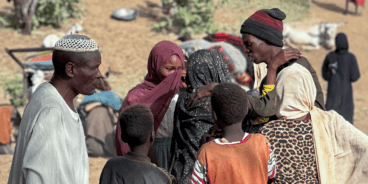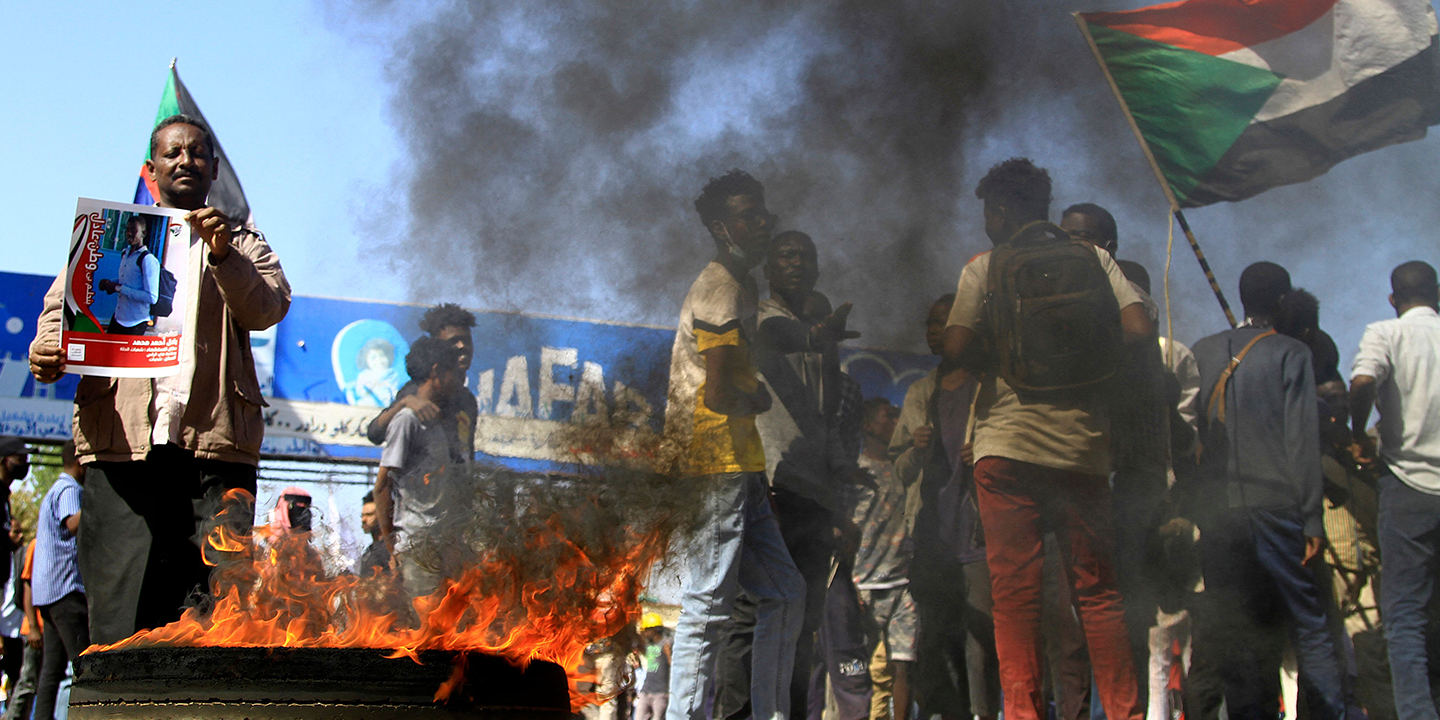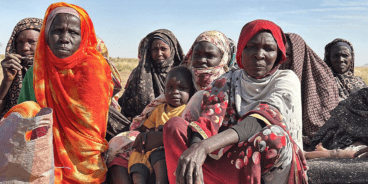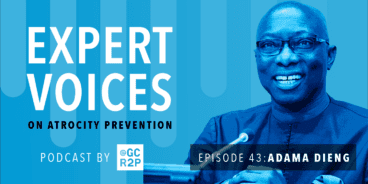

Atrocity Alert No. 289: Sudan, Somalia and Venezuela
Atrocity Alert is a weekly publication by the Global Centre for the Responsibility to Protect highlighting situations where populations are at risk of, or are enduring, mass atrocity crimes.
AT LEAST 200 PEOPLE INJURED DURING MASS PROTESTS IN SUDAN
On 21 February Sudanese security forces violently cracked down on demonstrations in Khartoum, Omdurman, Port Sudan and elsewhere, injuring more than 200 protesters. Thousands of people took to the streets as part of the “Break the Chains” millions march to demand the release of prisoners. The security forces reportedly used excessive force, including the firing of live ammunition and tear gas, against the largely peaceful protests.
Since the 25 October 2021 military coup, hundreds of thousands of protesters have continued to demonstrate across the country, demanding the reinstatement of the civilian-led government. Security forces have used excessive violence during almost all of the demonstrations, killing more than 80 people and injuring thousands. Security forces have also arrested and arbitrarily detained civilians, journalists, human rights defenders and others, including several prominent members of the so-called “Forces for Freedom and Change” and civilian members of the former Sovereign Council, since the coup. In December the UN Special Representative of the Secretary-General on Sexual Violence in Conflict, Pramila Patten, expressed grave concern about reports of sexual violence and harassment by security forces, including the use of rape and gang rape of women and girls, to disperse protesters who had attempted a sit-in.
The latest crackdown occurred while Adama Dieng, the UN Expert on Human Rights in Sudan and former UN Special Adviser on the Prevention of Genocide, is conducting his first official visit to the country to meet with Sudanese authorities, families of victims and civil society groups, to discuss the path forward amid the ongoing crackdown. Mr. Dieng was appointed in November after the UN Human Rights Council held a Special Session on the human rights implications of the military coup.
Juliette Paauwe, Senior Research Analyst at the Global Centre for the Responsibility to Protect, stated that, “the international community must continue to pressure the Sudanese authorities to fully restore the political transition, taking into account the people’s desire for democratic reform.” Security forces should protect the fundamental right to peaceful assembly and refrain from using excessive and deadly force against protesters. Thorough, independent and transparent investigations into the killings of peaceful protesters and other human rights violations, including sexual violence, need to be launched.
INCREASING ATTACKS BY AL-SHABAAB THREATEN CIVILIANS IN SOMALIA
On Saturday, 19 February, at least 15 people were killed by a suicide bomb in Beledweyne, Somalia. Witnesses say the attack tore through a restaurant popular with local officials and politicians. The armed extremist group Al-Shabaab later took responsibility for the attack. The incident was the latest in a recent surge of violence led by the group, including attacks on police stations and government checkpoints in the capital of Mogadishu earlier in February.
The increase in attacks has been fueled by the long-delayed electoral process. Presidential elections are set to be completed by 25 February, months later than initially planned due to political infighting and a volatile security situation. An earlier attack on 10 February targeted a minibus full of electoral delegates in Mogadishu, killing at least 6 civilians. Reuters has reported that one of the people killed in Saturday’s attack was a candidate in the parliamentary vote.
On 15 February the UN Special Representative on Somalia, James Swan, warned the UN Security Council that Al-Shabaab continues to pose a major security threat in Somalia. The Special Representative warned that political divisions and election delays have allowed insurgent forces to make some recent gains, including through intensified operations in Hirshabelle and Galmudug. The UN Assistance Mission in Somalia has also continued to document killings of civilians, attacks on schools and hospitals, recruitment of child soldiers, abductions, rape and sexual violence. These acts may amount to war crimes. Al-Shabaab is the primary perpetrator of these crimes, with various other militias and security forces also perpetrating abuses.
Climate-related factors are also increasing the risk of violence in Somalia. The Horn of Africa is currently experiencing the worst drought in decades, causing a crucial shortage of water. The drought has driven civilians to migrate to more densely populated areas, placing them at risk of attacks from Al-Shabaab and other armed groups. Currently 7.7 million Somali’s require humanitarian assistance while at least 2.9 million people remain displaced by conflict and climate-related factors.
Savita Pawnday, Executive Director of the Global Centre for the Responsibility to Protect, stressed that, “all stakeholders in Somalia must put aside their differences and personal ambitions in order to make progress towards peace. Al-Shabaab and other groups will not be defeated until faced by a united front that can give civilians the security and stability they deserve.”
LATEST REPORT REAFFIRMS POSSIBLE CRIMES AGAINST HUMANITY IN VENEZUELA
Amnesty International, Foro Penal and Centro para los Defensores y la Justicia (CDJ) issued a report on 10 February outlining instances of an “extremely high” correlation between public discrimination and politically motivated arbitrary detentions of perceived government critics in Venezuela. Their research findings show that “calculated repression” by the government of President Nicolás Maduro may amount to persecution as a crime against humanity.
The report analyzed the relationship between stigmatization and hate speech by government-connected media outlets, including infamous television programs, blogs or other web portals, and politically motivated arbitrary detentions between January 2019 and June 2021. The analysis showed that “three out of four times” that the media stigmatized perceived government opponents, politically motivated arbitrary detentions occurred within a few days. At least 1,270 politically motivated arbitrary detentions were recorded during the reporting period. These detentions particularly targeted human rights defenders, political activists and other perceived critics of the Maduro government.
This report reaffirms previous research by the UN Human Rights Council-mandated Fact-Finding Mission (FFM) on Venezuela, which concluded that arbitrary detentions, which are often accompanied by torture or sexual violence, were conducted as part of a “widespread and systematic attack” against the civilian population. The FFM found further evidence that in some cases the detentions amount to short term enforced disappearances.
Although state officials, including security forces and intelligence services, have been identified as direct perpetrators, the systematic patterns of repression are guided by state policies authorized at the highest level of government. According to the FFM, high-level officials, including President Maduro and members of his cabinet, “gave orders, coordinated activities and supplied resources for state policies of systematic repression.” The research conducted by Amnesty International, Foro Penal and CDJ found that peaks of repression increased during periods of heightened international scrutiny, including around the timing of reports and updates by the FFM, UN High Commissioner for Human Rights or International Criminal Court.
In light of ongoing government repression, member states should actively support the FFM to ensure continued investigations into potential crimes against humanity. States should also utilize the FFM’s recommendations to exert political pressure on the Maduro government to end systematic violations and abuses against actual or alleged opponents, including arbitrary detention and torture. Member states should also consider taking legal action, including under universal jurisdiction, against those responsible for possible crimes against humanity in Venezuela.
Related Content


Joint Statement: Genocide Returns to Darfur
